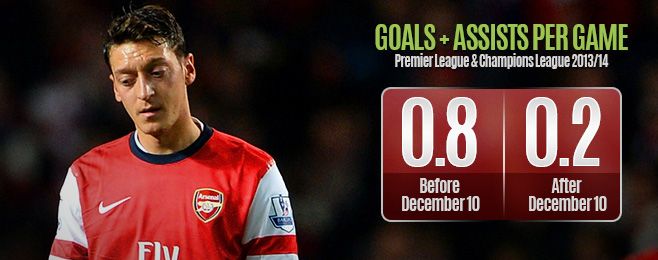
Mesut Ozil and his struggles caused by the lack of a winter break
 As fluid as Mesut Özil’s overall game is, and as much as the debate persists over what aspect of his play has actually regressed over the past few weeks, it’s possible to pick a specific date as to when he first dipped: 11 December 2013.
As fluid as Mesut Özil’s overall game is, and as much as the debate persists over what aspect of his play has actually regressed over the past few weeks, it’s possible to pick a specific date as to when he first dipped: 11 December 2013.
There do appear to be a number of distinct differences between the form before that date and the form after, for both player and club. It’s also difficult not to think the two are someway linked.
Özil’s initial signing undeniably coincided with a lift in Arsenal’s overall approach and, for three months, they were arguably playing their best football since the Invincible season. Some of the attacking performances were rampantly brilliant, with the side just appearing to soar through teams in a manner ultimately reflecting their record signing’s input. Özil was elusively excellent; the team excitingly elegant. A peak came away to Cardiff City, when they won 3-0.
The first slight cracks, however, appeared a week after that: on the occasion of Özil’s last goal.
On 7 December, after a Saturday in which both Chelsea and Manchester City had dropped points, Arsenal were hosting a notionally inferior Everton side and could have gone seven points clear. On 83 minutes, Özil scored the goal that seemed to secure the victory – only for Gerard Deulofeu to hit a late equaliser. It checked the team back, and then checked the player back. In the 2-0 defeat away to Napoli on 11 December, they were ragged, and Özil was irrelevant.
While none of this is to by any means say that specific Deulofeu goal mentally affected Arsenal or Özil, the temporarily tougher run of fixtures around that time did see a dip in the team’s level of performance, and precipitate a decline in the German’s productivity.

The fall-off is clear. Özil is scoring less – or just not scoring at all – assisting less and not creating all that much. Most starkly, the main playmaker has not fashioned a single clear-cut chance since the Everton game. That is remarkable for a star who was top of that chart right across Europe last season, with 24. As Manuel Neuer said on the eve of Bayern Munich’s trip to the Emirates, [Özil] can play the lethal passes which are very important and Arsenal need such a player to play those passes”. The lethality, however, is now the issue.
Although Özil is playing more key passes per game and an increased number of successful final third passes in general, the fact they are not hurting teams to the same extent almost sums it up. Özil is of course still doing his job, but it is as if the extra element of energy that usually elevates him is temporarily gone.
As a consequence, with their most imaginative player not quite so imposing, it is perhaps no surprise Arsenal have become more restrained since then. It is in fact to their credit that they have managed to retain such a high return of points, displaying admirable resilience. The difference between resiliently keeping pace and potentially staying ahead of the pack, however, may come down to Özil re-igniting. To do that, Wenger could have to give him more of a rest.
Much was made before the German arrived of the amount of times José Mourinho used to substitute him at Real Madrid, and the reasons for that are now clear: he was kept fresh.

None of his three seasons at the Bernabeu, for example, saw such drop-offs. In some seasons, he significantly improved in the second part of the campaigns. In 2012-13, the number of clear-cut chances he created went up from 0.61 to 0.81.
Compare all of that with his time at Arsenal. Whatever about adjusting to the intensity of the Premier League, Özil has not actually experienced as high a percentage of his team’s minutes since 2009-10 at Werder Bremen – but that was when he was not in European competition and the demands were much less taxing.

The problem, of course, is that Arsenal are now coming to the most exacting stage of the season. Sparing Özil the entirety of that, however, may ensure that their finest player produces the most exacting moments.